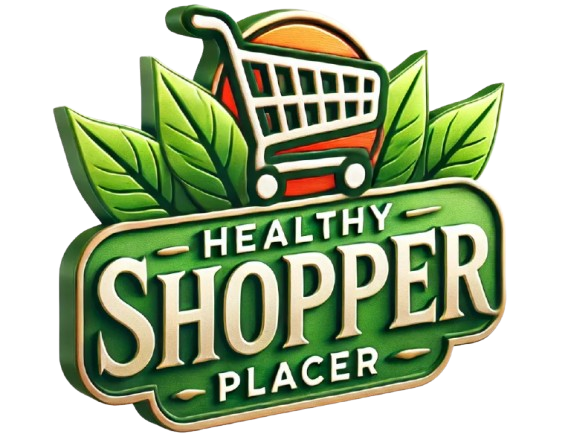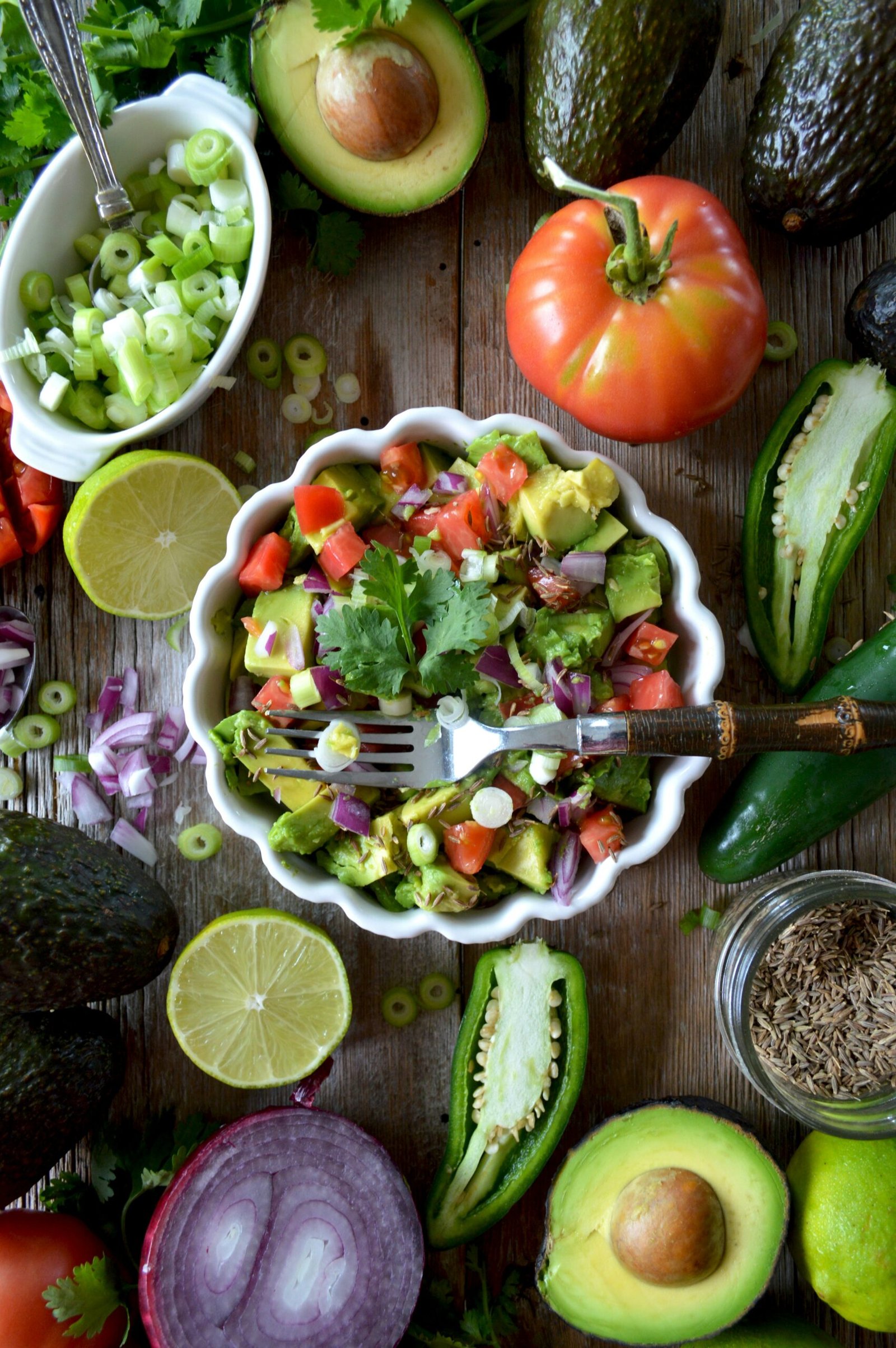
Fair Trade Coffee Brands You Need to Try
Ever thought about how your coffee affects the environment and farmers? Fair trade coffee lets you enjoy your coffee while helping farmers get fair prices. It also supports sustainable farming. The International Labor Organization says over 150 million kids are slaves in industries like coffee1.
Choosing fair trade coffee brands helps make the coffee world better. You support farmers and help the planet. It’s a win-win.
Imagine drinking coffee that tastes amazing and helps others. Brands like Equal Exchange are worker-owned and focus on social responsibility1. They make coffee that’s not only delicious but also fair.
By picking fair trade coffee, you’re making a difference. You help farmers and their communities. Learn more about fair trade at fair trade coffee brands that care about transparency and sustainability.
Key Takeaways
- Fair trade coffee brands prioritize social responsibility and exceptional taste.
- Choosing fair trade coffee supports farmers who receive fair prices for their products and promotes sustainable practices.
- 67% of American adults had coffee in the past day, more than any other beverage including tap water2.
- Fair trade coffee brands, such as Higher Ground Roasters, exclusively roast 100% certified organic and Fair Trade beans1.
- Fair Trade Certified has delivered more than $1 billion in cumulative financial benefits to farmers, workers, and fishers globally, starting in 19982.
- By opting for fair trade coffee, you are contributing to a more equitable and sustainable coffee industry.
What is Fair Trade Coffee?
Fair trade coffee ensures farmers get a fair price for their coffee. It promotes fair labor and sustainable farming3. This is key for brands that value ethics in coffee sourcing3.
It means coffee growers get a minimum price above the market rate3. Fair Trade USA and other organizations help ensure this happens3.
Key principles of fair trade include fair prices and labor, direct trade, and community development3. These are vital for sustainable coffee brands3. Fair trade aims to ensure farmers get a fair price, leading to better coffee and farming3.
Fair Trade USA works with almost 400 coffee producer organizations4. In 2021, they helped generate $31 million for community development4. This shows the positive impact on farmers and their communities.
Choosing fair trade coffee helps make the coffee industry more equitable and sustainable. It might cost a bit more because farmers are paid fairly3. But, it’s worth it for the quality and sustainability it brings.
| Fair Trade Certification | Benefits |
|---|---|
| Fair Trade USA | Guarantees fair prices and labor conditions |
| Fairtrade International | Promotes sustainable farming practices and community development |
| Rainforest Alliance | Conserves biodiversity and promotes eco-friendly farming practices |
Benefits of Choosing Fair Trade Coffee
Choosing fair trade certified coffee supports farmers and their communities. It also promotes environmental sustainability. Fair trade coffee beans are often of higher quality. This is because farmers are motivated to produce better beans5.
By choosing top fair trade coffee brands, you know your coffee is delicious and made fairly.
Some key benefits of fair trade coffee include:
- Support for coffee farmers, including fair prices and community development projects5
- Environmental sustainability, through eco-friendly farming methods and avoiding harmful agrochemicals6
- Better quality coffee, as farmers aim to produce high-quality beans5
Choosing fair trade coffee helps create a more equitable global trade system. It supports farmers in developing countries6. With more people wanting fair trade products, there’s a wide range of fair trade certified coffee options available.
| Benefits of Fair Trade Coffee | Description |
|---|---|
| Support for Coffee Farmers | Fair prices, community development projects, and pre-harvest credit options5 |
| Environmental Sustainability | Eco-friendly farming methods, prohibited use of harmful agrochemicals, and ecosystem preservation6 |
| Better Quality Coffee | High-quality beans, flavor profiles, and aroma5 |
Popular Fair Trade Coffee Brands
Choosing the best fair trade coffee brands is easy with many options. Consumers look at sustainability, environmental, and social factors. About 43% of the world’s consumers pick products based on these7. Brands like Equal Exchange, Cafédirect, and Higher Ground Coffee stand out for their social responsibility and sustainable farming.
These brands offer organic fair trade coffee. Some source beans directly from farmers and local cooperatives. This Direct Trade method pays farmers 30% more than fair trade prices7. Others, like Bridge Coffee Roasters, choose farms in Brazil, Colombia, Ethiopia, Rwanda, and Papua New Guinea. They focus on mutual respect, ethically grown coffee, and good working conditions7.
For certified fair trade coffee, some brands offer 100% Fair Trade Certified and Organic certified beans8. Prices start at $16.00 per package8. Some brands also offer discounts for fair trade coffee subscriptions. They guarantee a minimum price for coffee beans under Fair Trade certification8.
Popular fair trade coffee brands also have ground and whole bean coffee options. Three brands offer ground coffee, and one offers whole bean coffee8. To learn more about these brands and their fair trade commitment, visit healthy shopper placer. They have more information on fair trade coffee and sustainable products.
Specialty Fair Trade Coffee Brands
There are many specialty fair trade coffee brands to pick from. These brands offer top-notch coffee and support social and environmental causes. Kicking Horse Coffee, Grounds for Change, and Ethical Bean Coffee are some of the best9. They source their beans from all over, ensuring fair trade and helping local farmers.
Specialty coffee scores 80 or higher9. This means these brands must have excellent quality and taste. They offer unique flavors and are almost perfect, thanks to their high standards.
Here are some key features of these top fair trade coffee brands:
- Kicking Horse Coffee: 100% certified organic Fairtrade coffee10
- Grounds for Change: Offers a variety of fair trade coffee blends, including organic and shade-grown options
- Ethical Bean Coffee: Sources high-quality, fair trade coffee beans and promotes sustainable farming practices9
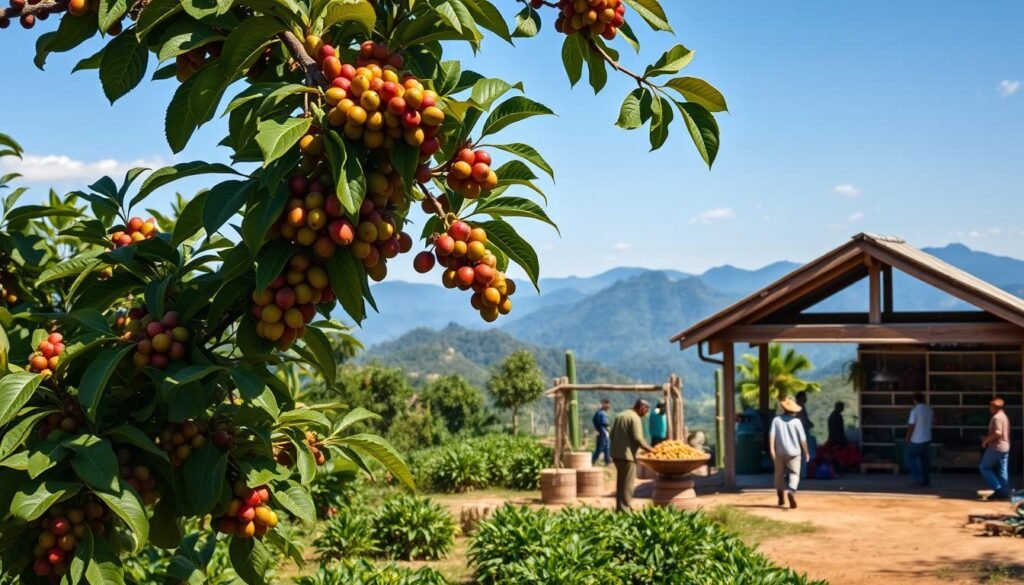
These brands focus on quality, taste, and doing good for the world. By choosing them, you help local farmers and support fair trade10. As more people want specialty coffee, these brands are at the forefront.
| Brand | Price | Certification |
|---|---|---|
| Kicking Horse Coffee | $8.48 for a 10-ounce pack | 100% certified organic Fairtrade |
| Ethical Bean Coffee | $10 for a 12-ounce bag | 100% organic fairtrade |
Fair Trade Certification Explained
Fair trade certification makes sure farmers and producers get fair prices and work in safe conditions. It also promotes sustainable farming11. This is key for companies that sell fair trade coffee, as it proves their beans come from high-quality sources12. When you buy fair trade coffee, you know you’re getting a product that’s both good and sustainable13.
The certification process checks if producers follow fair trade rules11. Groups like Fairtrade International and the Fair Trade Federation check this. They make sure farmers get fair prices and that farming is done in a way that’s good for the planet12. These groups also look for transparency, accountability, and help for the community, which are all important for fair trade13.
Buying fair trade certified coffee helps farmers get better prices and work in safer places11. It also helps the environment and supports community growth12. By choosing fair trade coffee, you help make the coffee world better and more fair for everyone13.
Buying Fair Trade Coffee
Buying fair trade coffee gives consumers many choices. Fair trade coffee brands offer top-notch beans that taste great. They also support farming and fair labor14. Look for brands certified by Fair Trade USA or the Rainforest Alliance.
Finding fair trade coffee is easy. Check local coffee shops or online stores. Specialty coffee shops and some online services offer organic fair trade coffee subscriptions14. You can also find it on Amazon or Thrive Market.
Some top places to buy fair trade coffee include:
- Specialty coffee shops
- Online retailers like Amazon or Thrive Market
- Local health food stores
- Co-ops or farmer’s markets
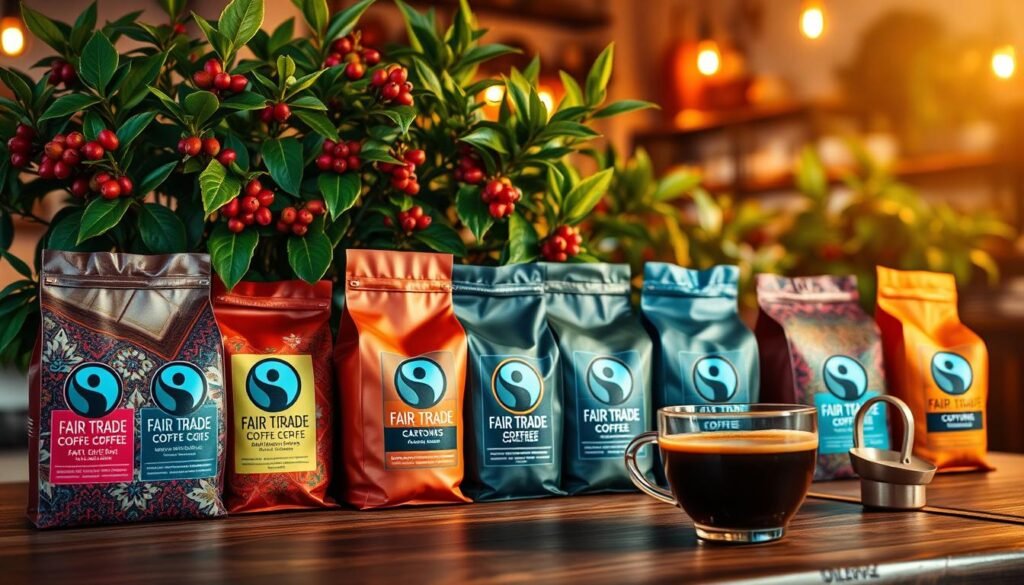
Buying fair trade coffee supports sustainable farming and fair labor. It also boosts rural economies15. By choosing fair trade coffee, you help coffee farmers and their families.
Fair Trade Coffee and Social Impact
Fair trade coffee helps farmers and communities a lot. It gives them fair prices and supports sustainable farming. It also helps with community projects16.
More than 870,000 coffee farmers are part of Fairtrade. There are 624 Fairtrade Producer Organisations worldwide16. Women play a big role in coffee farming, leading and working in production17.
Fair trade coffee has a big positive effect. 87% of Fairtrade coffee farmers value the Fairtrade Premium a lot17. This extra money helps farmers improve their lives and communities18.
Brands like Equal Exchange and Cafédirect focus on fair trade. They work with farmers to ensure coffee is made and traded fairly. By choosing these brands, we support coffee farmers and their communities16.
| Organization | Number of Farmers | Countries |
|---|---|---|
| Fairtrade | 870,000 | 30 |
| Equal Exchange | 40,000 | 20 |
| Cafédirect | 30,000 | 15 |
Environmental Impact of Fair Trade Coffee
Fair trade certified coffee is good for the environment. It supports sustainable farming like shade-grown and organic coffee19. This method cuts down on deforestation, saves biodiversity, and fights climate change. Fair trade companies also aim to lower their carbon footprint by using eco-friendly practices.
Some key environmental benefits of fair trade coffee are:
- Conservation of biodiversity
- Efficient water use
- No deforestation
- Reduced use of harmful pesticides and GMOs
Fair trade coffee is grown with the environment in mind19. It also supports community development through education, healthcare, and infrastructure. This can positively affect the environment20.
Every pound of fair trade coffee sold gives 20 cents to producers19. They can use this money for community projects, including environmental ones. This benefits both the environment and coffee farmers and their communities. For more information, visit Fair Trade USA or Healthy Shopper.
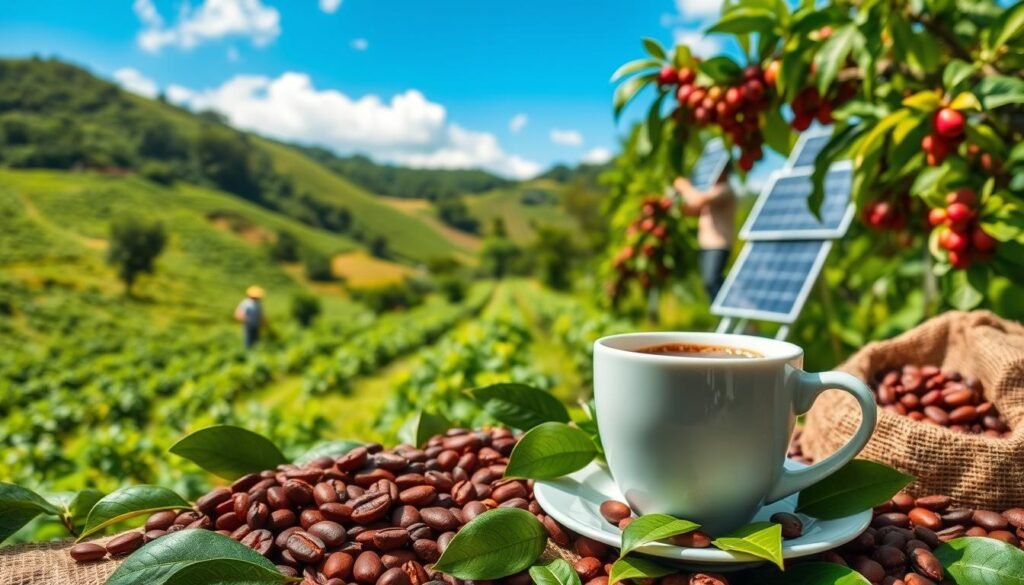
Choosing fair trade certified coffee supports sustainable farming. It helps make the coffee industry more eco-friendly. Companies like Equal Exchange and Cafédirect focus on sustainability and transparency in their supply chains20.
| Benefits of Fair Trade Coffee | Environmental Impact |
|---|---|
| Conservation of biodiversity | Reduced deforestation and habitat destruction |
| Efficient water use | Reduced water pollution and waste |
| No deforestation | Preservation of natural habitats and ecosystems |
Brewing the Best Fair Trade Coffee
Choosing the right beans is key to brewing the best fair trade coffee. Brands like Equal Exchange offer a variety of organic fair trade coffee. To highlight these beans’ unique flavors, using the right brewing methods is essential21.
Pour-over, French press, and espresso are popular methods. They bring out the distinct flavors of fair trade coffees21.
Here are some tips for finding the best fair trade coffee brands:
- Choose freshly ground specialty coffee beans for optimal flavor21.
- Experiment with different brewing techniques to find your perfect cup.
- Consider the flavor profiles of different fair trade coffees, such as bright and acidic or rich and smooth.
By following these tips and exploring fair trade coffee brands like Equal Exchange22, you can enjoy a delicious and sustainable cup of coffee. This supports fair trade practices.
The key to brewing the best fair trade coffee is attention to detail. This includes choosing the right beans and using the ideal brewing method21. With a little experimentation, you can find your perfect cup of fair trade coffee. This supports sustainable and equitable trade practices.
| Coffee Brand | Flavor Profile | Brewing Method |
|---|---|---|
| Equal Exchange | Rich and smooth | French press |
| Kicking Horse Coffee | Bright and acidic | Pour-over |
Fair Trade Coffee vs. Regular Coffee
Choosing between fair trade coffee and regular coffee involves several factors. Fair trade coffee is often pricier because farmers get fair prices23. This higher cost also reflects better working conditions and sustainable practices.
Fair trade coffee is known for its superior taste and quality. Farmers work hard to produce high-quality beans because of fair trade24. Brands like Equal Exchange and Cafédirect offer great-tasting coffee that supports social and environmental causes.
Here are some key benefits of choosing fair trade coffee:
- Supports fair prices for farmers and producers
- Promotes sustainable practices and environmental stewardship
- Empowers farmers and workers to improve their working conditions and livelihoods
While regular coffee might be cheaper, fair trade coffee offers long-term benefits. It supports sustainable coffee brands and fair trade companies2324. This makes it a better choice for those who care about social and environmental impact.
The Future of Fair Trade Coffee
The fair trade coffee market has grown a lot over the years. It has a 35-year history of the global Fair Trade model25. This growth comes from more people wanting fair trade certified coffee. It has led to fair trade coffee companies focusing on sustainability and social responsibility.
These companies make fair trade coffee beans popular. People choose them because they care about the environment and social issues.
Some trends in the fair trade market include more demand for organic and sustainable products. Direct trade coffee is also growing26. But, fair trade coffee faces challenges like limited market access and competition from regular coffee. To tackle these, fair trade coffee companies are using new ideas like solar-powered drying and reforestation programs.
The fair trade coffee market has seen big growth in the last ten years. Buying fair trade coffee has helped many small growers improve their lives27.
Here are some key statistics about the fair trade coffee market:
- Fair Trade coffee makes up a small part of coffee sales27.
- The fair trade coffee market has grown a lot in the last decade27.
- Over 600,000 coffee farmers and their families have been helped by Fair Trade Certified coffee25.
Fair Trade Coffee in the US Market
The US market has seen a big increase in demand for fair trade coffee. Many people choose organic fair trade coffee and support best fair trade coffee brands28. This is because more people understand the value of sustainable and socially responsible coffee production.
As a result, fair trade coffee brands are getting more popular. They offer a variety of products to meet different tastes and preferences.
Some major players in the US fair trade coffee market include Equal Exchange, Cafédirect, and Higher Ground Coffee1. These companies play a big role in promoting fair trade practices. They support coffee farmers and their communities. By choosing fair trade coffee brands, consumers help the well-being of coffee farmers and the environment28.
When it comes to price, organic fair trade coffee from companies like Equal Exchange costs between $26.00 and $70.00 per 5lb whole bean29. This price range makes it affordable for many who are willing to pay more for quality and sustainability. With the growing demand for fair trade coffee, the market is expected to keep growing. This will give consumers even more choices that align with their values.
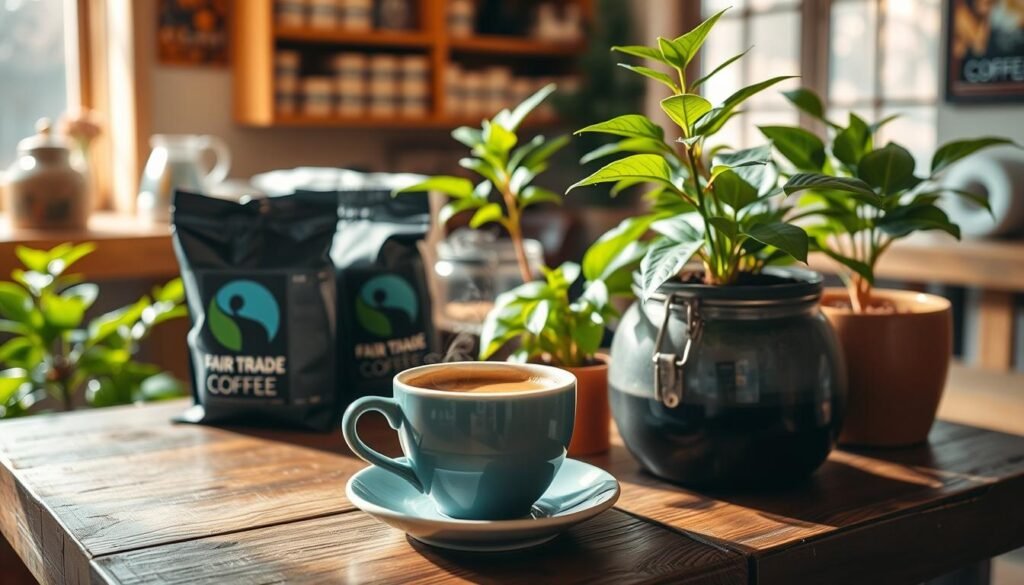
Fair Trade Coffee and Global Trade
Fair trade coffee changes the game in international coffee trade. It fights for fair prices, green farming, and helps communities grow30. It also shakes up old ways of making and trading coffee.
Some of the top fair trade coffee brands are at the forefront. They push for a greener, more caring coffee world.
Looking at sustainable coffee brands, fair trade is key. It shows they care about the planet and people.
The future of fair trade coffee looks bright. It could lead to a more caring, green coffee world30.
Here’s a quick look at why fair trade coffee is good:
| Benefits | Description |
|---|---|
| Empowerment and compensation for farmers | Fair trade coffee makes sure farmers get a fair deal for their beans |
| Environmental sustainability | It encourages farming that’s kind to the earth, cutting down coffee’s environmental harm |
| Community development | It backs projects that help communities in coffee countries grow |
In short, fair trade coffee could really change the global coffee scene. It’s all about being green, caring for people, and helping communities31.
Resources for Fair Trade Coffee Lovers
If you’re interested infair trade certified coffee, there’s a lot to explore. You can find books, documentaries, blogs, and websites that share valuable insights. These resources help you understand the fair trade coffee world better.
Books and Documentaries
Books like “Brewing Change” by Rick Peyser and Leslie Hatfield give a detailed look at thefair trade coffeeindustry. They show how it affects farmers and communities32. The documentary “Black Gold” also offers a deep dive into this topic.
Blogs and Websites
Online, you can visit sites like Fair Trade USA, Fairtrade International, and the Specialty Coffee Association. They provide a wealth of information on fair trade coffee. You’ll learn about certification, production, and market trends33.
Fair Trade Events and Festivals
Going to fair trade events is a great way to meet others who care about the cause. Events like the Fair Trade Federation Conference or the Fair Trade USA Annual Gala are perfect. They offer a chance to learn and support the fair trade movement32.
FAQ
What is fair trade coffee?
What are the benefits of choosing fair trade coffee?
What are some popular fair trade coffee brands?
What are some specialty fair trade coffee brands?
How does fair trade certification work?
Where can I buy fair trade coffee?
What is the social impact of fair trade coffee?
What is the environmental impact of fair trade coffee?
How do I brew the best fair trade coffee?
What are the differences between fair trade coffee and regular coffee?
Source Links
- 15 Fair Trade Coffee Brands Worth Waking Up For
- Ethically Sourced Coffee Guide: Sustainable Coffee Brands, How to Buy
- What is Fair Trade Coffee? | Fair Trade Guide | Trade Coffee
- Fair Trade Coffee: Why is Fair Trade Certified Coffee Important?
- Fair Trade Coffee
- Why Fair Trade Coffee is Important: A Comprehensive Guide – Sirincci Coffee Company
- Top 6 Fair Trade Brands Tried And Tested For International Coffee Day
- Buy Fair Trade Certified Organic Coffee Beans Online – Non Toxic Coffee
- The Fair Trade Coffee Collection
- Fair Trade Coffee: 9 Brands to Start Your Day
- What is Fair Trade Coffee? | Fair Trade Guide | Trade Coffee
- Fair Trade Coffee
- How Fairtrade certification works
- Buy Fair Trade Certified Organic Coffee Beans Online – Non Toxic Coffee
- The Fair Trade Coffee Collection
- Coffee
- Coffee Impact Report – 2021
- Fair Trade Coffee and Direct Trade Coffee Explained
- Why Fair Trade Coffee Matters for The Environment
- Fair Trade Coffee and Direct Trade Coffee Explained
- The Fair Trade Coffee Collection
- Fair Trade & Organic Coffee
- Fair Trade Coffee Vs. Regular Coffee: What’s The Difference? – Tasting Table
- Fair Trade Coffee and Direct Trade Coffee Explained
- Fair Trade Coffee Innovation – Fair Trade Certified
- Fair Trade Coffee and Direct Trade Coffee Explained
- The Problem With Fair Trade Coffee (SSIR)
- Fair Trade Coffee
- Fair Trade & Organic Coffee
- Fair Trade Coffee and Direct Trade Coffee Explained
- The Fair Trade Coffee Collection
- A Guide to Ethical, Sustainable, and Fair Trade Coffee Brands
- Useful Resources
